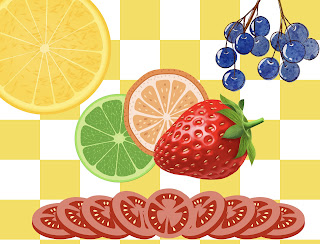Vitamin C, also known as ascorbic acid, is a vital nutrient that plays a significant role in maintaining good health.
The human body cannot produce vitamin C on its own, and it must be obtained through diet or supplements.
Vitamin C is essential for numerous bodily functions, including promoting a healthy immune system, collagen synthesis, and iron absorption.
It is also a powerful antioxidant, protecting the body from harmful free radicals and oxidative stress. In this article, we will discuss the definition, function, food sources, and deficiencies of vitamin C and provide tips on how to get enough of this vital nutrient.
Definition of Vitamin C
Vitamin C is a water-soluble vitamin that is essential for the growth and repair of tissues and the formation of collagen, an essential protein found in skin, bones, tendons, and cartilage. Vitamin C also acts as an antioxidant, protecting the body against oxidative stress, which can damage cells, tissues, and DNA.
Functions of Vitamin C
Vitamin C has numerous functions in the human body, including:
1. Promoting a healthy immune system
Vitamin C helps the body produce white blood cells, which are essential in fighting infections and diseases.
2. Collagen synthesis
Vitamin C is necessary for the production of collagen, which is vital for the health of skin, bones, cartilage, tendons, and other tissues.
3. Wound healing
Vitamin C helps the body heal wounds by promoting the growth of new tissue and blood vessels.
4. Iron absorption
Vitamin C helps the body absorb iron, which is essential for the production of red blood cells.
5. Antioxidant
Vitamin C is a powerful antioxidant that protects the body against oxidative stress and prevents damage to cells, tissues, and DNA.
Food Sources of Vitamin C
Vitamin C is found in a variety of fruits and vegetables, including:
1. Citrus fruits
Citrus fruits, such as oranges, lemons, limes, and grapefruits, are excellent sources of vitamin C.
2. Berries
Berries, such as strawberries, raspberries, blueberries, and blackberries, are also high in vitamin C.
3. Bell peppers
Bell peppers, particularly red bell peppers, are a great source of vitamin C.
4. Dark leafy greens
Dark leafy greens, such as spinach, kale, and collard greens, are also a good source of vitamin C.
5. Tomatoes
Tomatoes are a good source of vitamin C, particularly when cooked.
6. Broccoli
Broccoli is a nutrient-dense vegetable that is an excellent source of vitamin C.
It is worth noting that cooking can reduce the vitamin C content in food. Therefore, it is essential to consume fruits and vegetables raw or lightly cooked to maximize vitamin C intake.
Deficiencies of Vitamin C
Vitamin C deficiency is uncommon in developed countries due to the widespread availability of vitamin C-rich foods and supplements.
However, people who consume a diet low in fruits and vegetables, those who smoke, and those who have a medical condition that affects vitamin C absorption can be at risk of deficiency.
Symptoms of vitamin C deficiency include:
1. Fatigue
2. Weakness
3. Wound healing issues
4. Joint and muscle aches
5. Easy bruising
6. Dry and brittle hair
7. Swollen or bleeding gums
8. Skin problems, such as dryness, roughness, and hyperpigmentation.
Severe vitamin C deficiency can cause scurvy, a potentially life-threatening condition that affects the skin, bones, and other tissues.
Scurvy was once a common disease among sailors who spent long periods at sea without access to fresh fruits and vegetables.
The symptoms of scurvy include fatigue, weakness, anemia, swollen and bleeding gums, and joint pain.
Vitamin C is a vital nutrient that plays a crucial role in maintaining good health.
It is necessary for many bodily functions, including the immune system, collagen synthesis, wound healing, and iron absorption.
Consuming a diet rich in vitamin C from fruits and vegetables is the best way to obtain this critical nutrient.
However, people who are at risk of deficiency, such as those who smoke or have a medical condition that affects vitamin C absorption, may need supplements to ensure adequate intake.
Like with any nutrient, it is always best to speak with your healthcare provider before starting any vitamin C supplementation.
By getting enough vitamin C, you can enjoy a more robust immune system, healthier skin, and overall good health.





